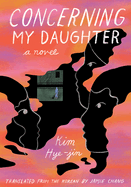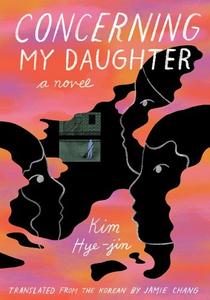
 Award-winning Korean novelist Kim Hye-jin's Concerning My Daughter is a clear-eyed character study of the fraught relations among biological and found families alike. When an unnamed, widowed narrator agrees to let her adult daughter, Green, move in with her, she's already wary of how their lives will cohere. And that's before Green reveals that her girlfriend, Lane, will be joining her. While Green's mother resists accepting her daughter's partner, she is simultaneously thrown into chaos at work as her managers at the nursing home conspire to provide a lower quality of life for the patient she feels most intimate with, a once-successful diplomat named Jen, now suffering from dementia. While the narrator struggles with how to articulate the ways in which she cares for Jen, Green becomes involved in a campus protest against her employer's discrimination toward gay colleagues, leading Green's mother to reconsider what "family" might mean in the context of her own heart.
Award-winning Korean novelist Kim Hye-jin's Concerning My Daughter is a clear-eyed character study of the fraught relations among biological and found families alike. When an unnamed, widowed narrator agrees to let her adult daughter, Green, move in with her, she's already wary of how their lives will cohere. And that's before Green reveals that her girlfriend, Lane, will be joining her. While Green's mother resists accepting her daughter's partner, she is simultaneously thrown into chaos at work as her managers at the nursing home conspire to provide a lower quality of life for the patient she feels most intimate with, a once-successful diplomat named Jen, now suffering from dementia. While the narrator struggles with how to articulate the ways in which she cares for Jen, Green becomes involved in a campus protest against her employer's discrimination toward gay colleagues, leading Green's mother to reconsider what "family" might mean in the context of her own heart.
In Jamie Chang's translation from the Korean, Green's mother's voice guides Concerning My Daughter with a no-nonsense approach to seemingly even the most intimate of topics. Kim captures everything from the raw details of cleaning the bodies of dementia patients to the immovable "dark silence" that "flows" between mothers and daughters when communication changes nothing. This unflinching perspective illuminates the extraordinary power of tenderness in such a context, of the sometimes fleeting and impossible moments that make connection possible, of "soft, sweet cake. A satisfied look... a big dollop of cream [on] a piece of strawberry.... Little, ordinary moments everyone has the right to enjoy."
As the narrator reflects on her situation with her daughter through her workplace dilemma with Jen, her practicality leads her to begin to see and despise the underhanded systemic violence at the center of her communities. Kim's keen attention to character reveals the nuance of her narrator's pragmatic brand of empathy. Her disappointment is often not a result of others' actions, but rather a reflection of her disappointment with herself: "My daughter's mistakes are my mistakes." In this way, Concerning My Daughter manages to capture a societal need for both accepting collective complicity and practicing enduring empathy. --Alice Martin, freelance writer and editor
Shelf Talker: A patient and thoughtful meditation on the personal and political stakes of caring for others, Concerning My Daughter is a layered but concise character sketch.

